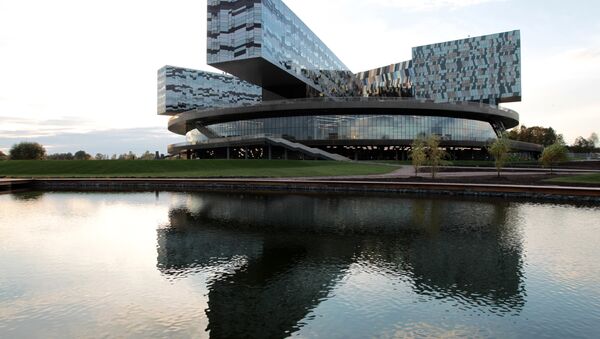Such technologies have facilitated economic synergy between the United Kingdom and Russia, with tech companies diversifying Russian markets via initiatives promoted by the Skolkovo Innovation Centre in Moscow and UK Department of International Trade assisting startups within the UK.
Sputnik spoke with Ramy Elnagar, Co-Founder of Somewhere Else, a London-based immersive technology agency working with dozens of multinational blue-chip companies and Dmitry Koshechkin, brand ambassador for Motorica, a state-of-the-art prosthetics and physical rehabilitation company based at the Skolkovo Innovation Centre in Moscow.
Sputnik: What brings you to the Russian-British Business Forum, and what is the focus of your product?
Ramy Elnagar: We are here today to discuss our unique approach to enterprise solutions. We specialise in advising strategically on how to use emerging technologies like virtual and augmented reality.
We do so at public and private levels. For example, one of our projects currently revolves around training mental health nurses to empathise with their patients with hopes to roll that out with the likes of the NHS. We would like to build on these new solid use cases and are here today to do so.
Sputnik: What kind of companies would benefit the most from these kinds of technologies? Which kind of sectors would you like to tap into the most?
Ramy Elnagar: We would like to focus on business-to-business (B2B) relationships in the immediate future whilst allowing business-to-customer to gain momentum as Samsung and Oculus currently drive surges in consumer markets. We should realise that headsets are not going to make it into homes anytime soon. People have been placing their bets on this by asking "What's going to be the next iPhone moment for virtual reality"?
Because you have no clear reason why you would use this in your own home or office, it will not make it there; therefore, we focus on enterprises.
We have found three key propositions in relation to enterprises. Firstly, there is training, which is across any sector and any place with a large number of employees requiring standardised knowledge, allowing us to develop simulations across thousands of participants without any added costs.
Secondly, we utilise whole world simulations and visualisations. For example, we were talking with a leader in pyrotechnics who coordinated large-scale fireworks shows at the same magnitude as New Year's Eve displays in major cities like London and New York, and for these companies, little mistakes such as misplacing audiences can result in bad experiences for thousands of attendees.
What we do is enact a "live" scenario where we can simulate the entire city to put yourself in the audience's shoes in order to plan the event precisely, simulate various pyrotechnical choreographies and at the end, export everything to the rigging teams so that they can accurately install all fireworks components.
These use cases are quite niche at the moment, so there's no dream industry to tap into, but we look for useful applications instead. That is why we are an immersive tech agency because we are pushing to work with strategic partners at the industry level in order to use emerging technologies for maximum impact and solving concrete problems.
Sputnik: A major theme of your presentation was about overcoming boundaries and limitations. How has your company influenced and empowered the lives of your clients?
Dmitry Koshechkin: We can start by speaking about the history of our clients, because around 70 percent of them are children and when they use our prosthetics, they feel both excited and empowered.
For example, young Russian clients using our technologies love to give each other nicknames like "cyborg" or "Terminator" in schools and universities, so this is one example of how our company impacts their lives by changing perceptions toward their handicaps.
When Russians speak about people with disabilities, they normally think of people confined at home [who are] unable to walk or do activities.
However, our prosthetics offer our clients the chance to overcome these stigmas and are symbolic by empowering them as if they are ‘cyborgs' and ‘terminators', giving them an fresh self-image and renewed confidence.
Sputnik: Many people are developing technologies such as cybernetics, prosthetic organs and exoskeletons. How do you see transhumanism and futurism reshaping Man's evolution?
Dmitry Koshechkin: First of all, these technologies are useful for people with disabilities — people without arms, hands and legs — but in the future, interest in these emerging technologies will grow. Exoskeletons will become increasingly more popular as people can wear suits which increase their strength and enhance their capabilities.
In Russia, new trends are emerging and our company has created this one because of the technology's value to users, especially those who are handicapped and disabled. In the future, however, I believe that more unique technologies will emerge where people could integrate with them, including life extension technologies and others.
The views and opinions expressed by the speakers do not necessarily reflect those of Sputnik.




